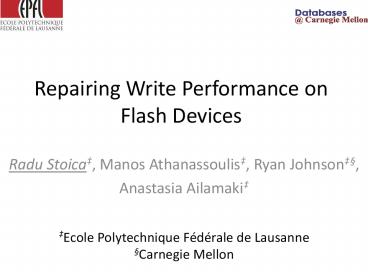Repairing Write Performance on Flash Devices - PowerPoint PPT Presentation
Title:
Repairing Write Performance on Flash Devices
Description:
Radu Stoica , Manos Athanassoulis , Ryan Johnson , Anastasia Ailamaki Ecole Polytechnique F d rale de Lausanne Carnegie Mellon – PowerPoint PPT presentation
Number of Views:110
Avg rating:3.0/5.0
Title: Repairing Write Performance on Flash Devices
1
Repairing Write Performance on Flash Devices
- Radu Stoica, Manos Athanassoulis, Ryan
Johnson, - Anastasia Ailamaki
Ecole Polytechnique Fédérale de
Lausanne Carnegie Mellon
2
Tape is Dead, Disk is Tape, Flash is Disk
- Slowly replacing HDDs (price , capacity )
- Fast, reliable, efficient
- Potentially huge impact
- Slow random write
- Read/write asymmetry
- -gt not a HDD drop-in replacement
Jim Gray, CIDR 2007
3
DBMS I/O today
Request
DBMS
Data requirements
HDD optimized I/O pattern
Block Device API
Flash optimized I/O pattern
Flash device
Flash memory access
Inadequate device abstraction
Flash devices are not HDD drop-in replacements
4
Random Writes Fusion ioDrive
- Microbenchmark 8 kiB random writes
Unpredictability
94 performance drop
5
Stabilizing Random Writes
- Change data placement
- Flash friendly I/O pattern
- Avoid all random writes
- Minimal changes to database engine
- 6-9x speedup for OLTP-like access patterns
6
Overview
- Random Write how big of a problem?
- Random Write why still a problem?
- Append-Pack Data Placement
- Experimental results
7
Related work
Request
DBMS
Data requirements
Flash-opt. DB Algs.
HDD optimized I/O pattern
Data placement
Block Device API
Flash FS
Flash optimized I/O pattern
Flash device
FTL
Flash memory access
No solution for OLTP workloads
8
Random Write Other devices
Vendor advertised performance
Rand. Write Rand. Read
Mtron SSD
Rand. Write causes unpredictability
Graph from uFlip, Bouganim et al. CIDR 2009
9
Random Writes Fusion ioDrive
- Microbenchmark 8 kiB random writes
10
Sequential Writes Fusion ioDrive
- Microbenchmark 128kiB sequential write
Seq. Writing Good Stable Performance
11
Idea Change Data Placement
- Flash friendly I/O pattern
- Avoid all Random Writes
- Write in big chunks
- Tradeoffs additional work
- Give up seq. reads (SR and RR similar
performance) - More seq. writing
- Other overheads
12
Overview
- Random Write how big of a problem?
- Random Write why still a problem?
- Append-Pack Data Placement
- Theoretical model
- Experimental results
13
Append-Pack Algorithm
Update page
Update page
Update page
No more space
Write hot dataset
Write seq.
Reclaim space
No in-place updates
Filter cold pages
Write cold dataset
Reclaim space
Log start
Valid page
Log end
Invalid page
How much additional work?
14
Theoretical Page Reclaiming Overhead
- Update pages uniformly
- Equal prob. to replace a page
- valid pages?
prob(valid) f (a) ? e -a
a
Worst case 36 Easily achievable 6-11
15
Theoretical Speedup
- Traditional Random Write I/O latency TRW
- New latency TSWprob(valid)(TRR TSW)
- Conservative assumption TRW 10TSW
a sizeof(device) / sizeof(data)
Up to 7x speedup
16
Overview
- RW how big of a problem?
- RW why still a problem?
- Append-Pack Data Layout
- Experimental results
17
Experimental setup
- 4x Quad-core Opteron
- X86_64-linux v2.6.18
- Fusion ioDrive 160GB PCIe
- 8 kiB I/Os, Direct I/O
- Parallel threads 16
- Firmware runs on host
- Append-Pack implemented as shim library
18
OLTP microbenchmark
- Microbenchmark 50 Rand Write / 50 Rand Read
FTL?
9x improvement
Time (s)
19
OLTP Microbenchmark Overview
Performance better than predicted
20
What to remember
- Flash ? HDD
- We leverage
- Sequential Writing to avoid Random Writing
- Random Reading as good as Sequential Reading
- Append-pack eliminate Random Writes
- 6-9x speedup
21
- Thank you!
- http//dias.epfl.ch
22
Backup
23
FTLs
- Fully-associative sector translation Lee et al.
07 - Superblock FTL Kang et el. 06
- Locality-Aware Sector Translation Lee et al.
08 - No solution for all workloads
- Static tradeoffs workload independence
- Lack of semantic knowledge
- Wrong I/O patterns
- -gt complicated software layers destroy
predictability
24
Flash FS
- Flash aware file systems
- JFFS2
- YAFFS
- No FTL required (handle wear leveling)
- Mostly for embedded devices
25
Other Flash Devices - Backup
Device RR (IOPS) RW (IOPS) SW (MB/s) SR (MB/s)
Intel x25-E 35,000 3,300 170 250
Memoright GT 10,000 500 130 120
Solidware 10,000 1,000 110 110
Fusion ioDrive 116,046 93,199 (75/25 mix) 750 670
Vendor advertised performance
26
Experimental Results - Backup
RR/RW Baseline Append/Pack Speedup Prediction
50/50 38 MiB/s 349 MiB/s 9.1 6.2
75/25 48 MiB/s 397 MiB/s 8.3 4.3
90/10 131 MiB/s 541 MiB/s 4.1 2.5
(a 2 in all experiments)
27
OLTP microbenchmark - Backup
50 RW/50 RR - before
- 50 RW/50 RR - after
28
OLTP Microbenchmark - Backup
Traditional I/O
29
OLTP Microbenchmark - Backup
Append-Pack































